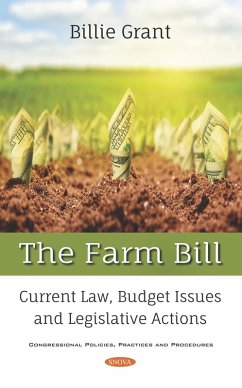Congress has been active in establishing federal policy for the agricultural sector on an ongoing basis since the 1930s. Over the years, as economic conditions and technology have evolved, Congress has regularly revisited agricultural policy through periodic farm legislation. Over these decades, the breadth of policy areas addressed through such farm bills has expanded beyond providing support for a limited number of agricultural commodities to include establishing programs and policies that address a spectrum of related areas, such as agricultural conservation, credit, rural development, domestic nutrition assistance, trade and international food aid, organic agriculture, and support for beginning and veteran farmers and ranchers, among others. Congress sets national food and agriculture policy through periodic omnibus farm bills. The 115th Congress has the opportunity to establish the future direction of farm and food policy because many of the provisions in the current farm bill expire in 2018. Chapter 1 provides a title-by-title summary of the policies and provisions in H.R. 2 and compares them with current law. The Trump Administration released its first full budget request on May 23, 2017. It proposes specific amounts for the FY2018 Agriculture appropriation as well as legislative changes to various mandatory spending programs, including those in the farm bill. Chapter 2 separates the President's budget request into proposed changes for agriculture based on congressional jurisdiction. Over time, farm bills have tended to become more complicated and politically sensitive. As a result, the timeline for reauthorization has become less certain. Chapter 3 reports on the budget issues shaping the 2018 farm bill while chapter 4 examines the major legislative milestones for the last 12 farm bills covering 54 years. Three farm bills have contained an energy title: the 2002 farm bill, the 2008 farm bill, and the 2014 farm bill. For all three farm bills, the major energy programs expire and lack baseline funding. Chapter 5 presents data on 2014 farm bill budgetary authority for energy provisions, as well as the original budget authority for Title IX programs under the previous 2008 farm bill. The timing and consequences of expiration vary by program across the breadth of the farm bill. There are two principal expiration dates: September 30 and December 31. Chapter 6 reports on the possible consequences of expiration including minimal disruption (if the program is able to be continued via appropriations), ceasing new activity (if its authorization to use mandatory funding expires), or reverting to permanent laws enacted decades ago (for the farm commodity programs).
Dieser Download kann aus rechtlichen Gründen nur mit Rechnungsadresse in A, B, BG, CY, CZ, D, DK, EW, E, FIN, F, GR, HR, H, IRL, I, LT, L, LR, M, NL, PL, P, R, S, SLO, SK ausgeliefert werden.









